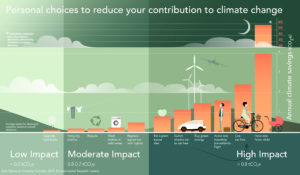By the time  you read this it will be too late to attend the Climate Change Symposium. However, there are several points I want to make by broadcasting information about this symposium:
A small group of committed activists can make a difference in their communities. The Fort Lewis College Environmental Center is a wonderful organization that has reached hundreds of students through the years; their two person staff has taken on this large project with some volunteers and great aplomb.
It is important to involve young people–by the latest count, we will have over 300 high school students attending
Top speakers are willing to come to a little community such as Durango. Katharine Hayhoe will be in Canada, but she will reach us by a video made just for this symposium. We will also be showing one of her YouTube videos. Travis Rieder will be at his office at Johns Hopkins University but communicating by Zoom. Dr. Rieder spoke in Durango a couple of years ago and won a lot of praise for his presentation on the ethical imperative of having small families.
Thank you for reading!
Richard
“Humans are at the centre of global climate change: …social change is key to effectively respond to climate change†  IPPC Special Report
Do you remember the politicians in North Carolina who passed a law in 2012 that prohibited calculating sea level rise based on climate change predictions? They said only historical trends could be used.
That law, promoted by real estate developers, postponed planning for the consequences of climate change. Only 6 years later they were visited by a wrathful storm that dropped 3 feet of rain on parts of the state!
I wonder how the legislature feels now that they have been visited by reality in the form of Hurricane Florence. (Although the law concerned sea level rise, immense precipitation caused the damage.) My hope is that legislators have learned that they cannot mess successfully with the laws of nature and physics.
Many of the changes we’re experiencing now are due to anthropogenic (human caused) climate disruption. The list includes more destructive hurricanes; the estimated cost of Florence is 38 billion dollars and the human toll is 53 deaths.
Michael is the most recent hurricane; it was another monster. Almost a category 5 storm, it hit with terrifyingly destructive winds. There was “unimaginable destructionâ€, to quote Florida’s Governor Rick Scott. “So many lives have been changed forever. So many families have lost everything. Homes are gone. Businesses are gone.â€Â
Yet Scott does not believe in climate change. Apparently staff at the Florida Department of Environmental Protection were told not to use the terms “climate change†or “global warming†after he became governor.
Why have we been punished with so many destructive storms recently? Part of the problem is that governments are failing to recognize that climate change is increasing the frequency of these deadly and costly storms. Even a slight increase in the air and water temperatures gives significantly more energy to form cyclonic storms.
Senator Inhofe of Oklahoma wrote a book about climate change titled “The Greatest Hoaxâ€. I don’t think that people in Florida and the Carolinas will be reading that book much now.
How is it possible that some people who don’t believe that climate change is real, or think that it is all just natural cycles that are causing it? How is that possible when these people know that humans are increasing greenhouse gases in the atmosphere? How does one talk with someone who denies climate change?
“Climate Change Solutions†is the second symposium at Fort Lewis College on the subject. It will be held Tuesday October 30th. Last year’s meeting focused on the science, this year will focus on ways that individuals can help deal with this global problem.
The symposium is coming just in time! Evidence is mounting that there is urgent need for solutions to climate change. Earlier this month the Intergovernmental Panel on Climate Change (IPCC) published a special report which can be summarized: “…drastic action must be taken in limited time to avoid severe and worsening consequences.â€
Highly respected climate scientist Kevin Trenberth was one of the speakers last year. He wrote: “…humans are the main agents of change.†This is a bit ambiguous; in context, he meant that climate disruption is anthropogenic. It can also mean that we can also solve this global problem. Trenberth explained the destructiveness of this summer’s storms thusly: “While hurricanes occur naturally, humanâ€caused climate change is supercharging them and exacerbating the risk of major damage.â€
Climate Change Solutions will have 2 sessions, starting at 12:30 and 6:30, at the Community Concert Hall on the Fort Lewis College campus. Because cimate change will affect today’s kids much more than my generation, we have invited several hundred students from area high schools. All College people will have free admission.
A member of US Senator Michael Bennet’s staff will urge people to vote for politicians who don’t deny climate change, and update us on what is happening in Washington to fight this global disruption There will be suggestions about effective ways to talk to climate change deniers.
Another speaker will tell us about the most effective way to quell climate change. You guessed it! Climate change is really a symptom of overpopulation and of overconsumption. Choosing to have a small family is the most effective action in the long run an individual can take. We also need actions that will work in the short run.
For more information about Climate Change Solutions and tickets search the calendar at: https://www.durangoconcerts.com. I hope to see you there!
©Richard Grossman MD, 2018

